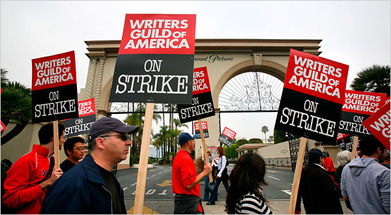Top 12 Film Industry Stories of 2007: #1:
Writers Strike, Hollywood Braces for Later Impact
By David Mumpower
January 1, 2008
Anyone who peruses this site is presumed to be an expert in emerging entertainment technologies. We frequently touch upon such advances in our columns, because the changing behavior of the industry impacts not only initial box office results but also the final revenue amount of a feature film. It is presumed you know by now that through places such as iTunes, CinemaNow and Netflix, a person may watch movies on the Internet. There are several other services of this ilk either in existence now or being prepared for launch in 2008. As computers interact more and more with smart television sets, the line is being blurred between conventional means of watching movies and previously impossible ones involving broadband connections. A purchase can be made that in no way involves a physical transaction of product transferring to consumer. Currently, writers are in no way compensated for any content watched over the Internet. Moving forward, such a scenario is simply bad business for any entertainment provider. The Internet matters as much as television if not more due to cross-breeding of the technologies.
Then, there is TiVo and the like. For those of you who don't own a personal video recorder such as TiVo (and I pity you if you don't), you may not realize how this works. The lack of knowledge of how a PVR works mainly applies to the Amish who somehow read this site sans computer and/or Internet connection, but I will explain it anyway. A movie is broadcast on television, and a person uses what amounts to a specially programmed computer complete with hard drive to record the content. They are then able to view the designated entertainment at their leisure.
This is a particularly tricky issue in Hollywood, because Nielsen ratings only recently began to reward viewership numbers for TiVo'd programs. Even worse, these numbers are only applied if the program is viewed within a designated period - ordinarily 72 hours – of broadcast. These ratings are the cornerstone upon which advertisers determine how to much to pay corporations in exchange for airing commercials during the programs. What this means is that the corporation airing a program may not be able to sell the same amount of ad space for its number of eyeballs viewing as its eyeballs recognized as viewing by Nielsen. Such a scenario occurs when the consumer fails to watch the program in the timely manner Nielsen expects. In addition, advertisers are reticent to pay for PVR recorded ratings add-ons anyway, because one of the main purposes of such a device is to skip over the very commercials that pay for the content.
In light of all of this, it is understandable why studio execs are less than enthusiastic about the proposition of paying talent for airings of broadcasts recorded on PVRs. The problem is that such talent - the writers, directors and actors involved - still expect to be compensated for their work based upon the agreed upon ratio for Nielsen numbers independent of what deal corporations get for the same number of viewers. The entire area of TiVo recordings is a boondoggle for all involved, making a compromise a bloody deal to negotiate.
Continued:
1
2
3
4
5
|
|
|
|

![]() Tweet
Tweet
![]() Print this column
Print this column



